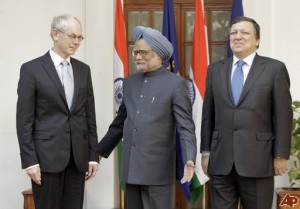Health activists oppose India-EU free trade pact


DELHI -- The India-European Union free trade pact, which has been five years in the making, could be done this year. President of the European Commission, Jose Manuel Barroso, said that the deal--one of the world's biggest--could be reached by autumn.
Speaking in Delhi on Friday, Barroso said that the pact is a signal of EU's "commitment to openness" and not protectionist policies especially during the prevailing financial crisis. "Trade is a means to generate growth," he said.
The 27 nation bloc is India’s largest trading partner. At the EU-India Summit in the capital, Prime Minister Manmohan Singh remarked that India's trade with Europe has reached $107 billion in 2011. Singh conveyed his best wishes to EU leaders to recover from the debt crisis in the Eurozone. "Given our rapidly growing links with Europe, this is in India’s interest," he said.
Singh said that India wanted to EU to help in its infrastructure development, clean energy technologies, innovation as well as research and skill development. "Greater investment flows in both directions in a win-win proposition for both sides," he said.
Since talks began in 2007, major areas of disagreement have been about the high tariffs on the import of European automobiles and wines, which the bloc wants lowered considerably. India wants easier visa and job regulations for its IT professionals to work in Europe.
Impact on affordable medicines
Activists, who have been protesting against the deal, are concerned about its negative impact on the production of inexpensive generic drugs by local Indian companies, which serve some of the poorest populations of the developing world. They are worried that the trade pact will strengthen patents on medicines, which will prevent manufacturing of their cheaper forms. This, in turn, will leave millions of people without affordable medicines.
Civil society organizations, like OXFAM and Médecins Sans Frontières (Doctors Without Borders), suspect big pharmaceutical companies of trying to beef up the intellectual property regime, which will hike medicine prices. “At a time of austerity and declining aid budgets, especially for health, efforts to increase medicine prices for the world’s poor would be a double blow and have a devastating impact on the achievement of health-related Millennium Development Goals," said Rohit Malpani, Oxfam policy advisor.
India presently produces over two-thirds of all generic medicine and over 80 percent of all HIV/AIDS medicines. According to OXFAM, the cost of medicines drops 90-99 percent with generic competition.
Médecins Sans Frontières (MSF) has launched a campaign called "Europe! Hands Off Our Medicine." Unni Karunakara, President of MSF’s International Council, said that MSF buys 80 percent of AIDS medicines from India, which keeps 160,000 people alive. “On their behalf, we cannot remain silent as Europe works to close the door on every aspect of drug supply – the production of a generic medicine, its registration, and its transportation," said Karunakara.
MSF said that the attack on the production of cheap drugs was taking various forms like "free trade agreements, international treaties, customs regulations."
Dealing with Iran
The EU also wants New Delhi to persuade Tehran to engage over its nuclear program. India, a major importer of crude oil from Iran, is at odds with the EU and the United States over their sanctions on Tehran's nuclear program. While EU feels a mix of diplomacy and sanctions is needed, India favors diplomacy. "We have a common interest in promoting stability in these areas," Singh said on Friday, referring to Afghanistan, Pakistan, Syria and Iran.
In a joint statement, issued at the end of the Summit, the parties "reaffirmed their commitment to diplomacy to resolve the Iranian nuclear issue and expressed the need for Iran to take constructive and immediate steps to meets its obligations to the IAEA and the U.N. Security Council."
Photo--AP/on Google Images
This post was originally published on Smartplanet.com